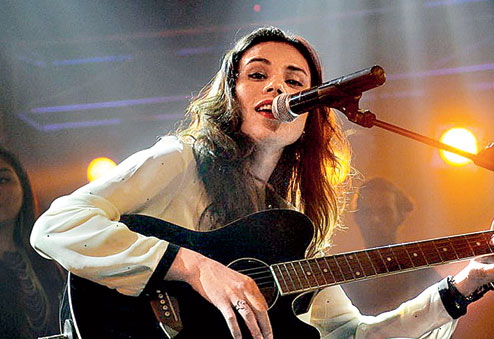Zoe Viccaji’s Coke Studio (Pakistan) performances haven’t gone unnoticed. Far from it, they’ve changed the life of the 30-year-old singer from Karachi as she takes over the airwaves with her just-released album Dareeche (Universal Music). This one has been in the making for several years and has received the final touches at the famed Abbey Road Studios in London. When t2 first caught up with her in October 2013, she was in the process of visiting India to experience the music scene here. Less than a year later, her album pops up.
She opens up to t2, once again.
 |
What does the album mean to you?
To me it’s a reminder of the phases that I have been through, the realities and sufferings that we experience in life that are sometimes difficult to cope with, and my effort to accept and let go, especially when I don’t understand the bigger picture.
Some of the tracks have an unplugged feel, like what we heard on Coke Studio (Pakistan). Walk us through the album’s soundscape....
The album was experimental in the fact that we touched various genres and tried to stay true to the mood and age of the song and treat it accordingly. The songs have been written over a span of 15 years and with the passing years I’ve encountered and listened to various kinds of music… likewise, the songs are reflective of the music I was listening to at the time I wrote them. For example, Raat gaye was written when I had just returned from college and was working in musical theatre, and so it has that vaudevillian theatrical feel to it. Ab aao na came about just when I was getting into eastern music and so it has the touch of the sitar and a more eastern approach.
 |
You have been composing songs since age 14-15. So these songs capture your experiences down the years...?
All of them are reflections of my experiences and emotions. The only one which I can consider as being outside myself is Sau dafa. A friend (Ali Alam) in Pakistan composed the song and then the very gifted Puneet Sharma from Mumbai moulded the words to what he felt would be mine. It used to be a song about heartbreak but Puneet turned it on its head and matched it more to my personality and made it about being strong-willed. It’s funny because I now listen to this song and it inspires me to stick to my guns and have more faith in my decisions.
Born to a Christian mother and Parsi father, have they influenced your music?
I’m not quite sure that I can say the Parsi element influenced me musically, but the fact that my mother was Christian and belonged to a church made a big difference. Music had always been a big part of her life; she was part of a church choir, and many of her friends also played an instrument or sang. As a result, our exposure to music was equally rigorous. Almost all occasions, Christmas, New Year’s, parties and picnics consisted of my mum’s friends conducting one big singalong, and even in the house my mum always had a range of music playing, from all the big Broadway musicals to the jazz greats like Ella (Fitzgerald), and to more contemporary artistes of her time, like the Beatles and ABBA. Looking at my songwriting style and performance, I think that range of music has formed my tastes to a large degree.
 |
Has it been a challenge making a career out of music? Also, is it toughter as a woman?
One of the biggest challenges has been figuring how to go about the whole thing. We don’t really have a fully formed music industry here in Pakistan, and India’s industry is predominantly Bollywood, so to make things happen has to be largely self-driven and one has to find their own way and learn the ropes the hard way…. Personally, being a woman hasn’t been the obstacle in making music a career. There are many social factors that influence how difficult it is to make a career out of music in Pakistan, but I haven’t found any to be gender specific.
Had you been living in London or New York, would your career have been different?
I’d probably have stuck to singing and writing in English. I also think I would not have been a solo artiste. I’d either be part of a band or troupe, or even have gone into musical theatre.
A part of the album was recorded in Mumbai. What about the city do you like?
The album was actually all recorded in Pakistan at Indus World Music Studio but some tracks were re-recorded in India at Universal Publishing’s studio. I really appreciated the fact that the team at Universal was genuinely interested in making the album better and offering their studio and crew to me in any way that I needed. The in-house engineer Devashish Ray (Debu) remixed the entire album and then it was sent for mastering to Abbey Road Studios in London. I love that Mumbai is so much like my own city of Karachi, but a lot more liberal. I feel right at home and more free to just ‘be’.
Will you stay away from Bollywood?
If a song is good and it can find its way into and be happy in the Bollywood sphere, I’m all for it.
Finally, why call it Dareeche?
Dareeche means windows, since the album is a look into various phases and experiences.
Mathures Paul
Who is your favourite singer from Pakistan?Tell t2@abp.in

